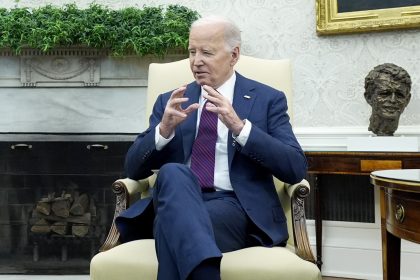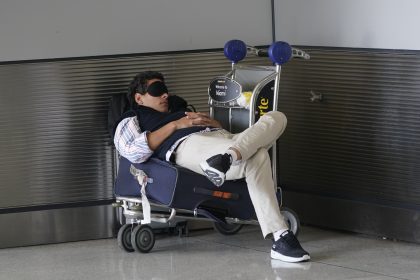Airlines, Government at Odds Over Passenger ‘Contact Tracing’

WASHINGTON — Two months after lawmakers lamented public health officials’ inability to contact air travelers arriving in the U.S. who may have been exposed to the coronavirus, the federal government and airlines are still at odds over who should take the lead on such efforts.
Airlines and third-party groups that sell airline tickets argue the government bears the responsibility for gathering information to track down travelers coming in from overseas who may have been exposed to the disease.
The Centers for Disease Control and Prevention, meanwhile, is finalizing a rule that would compel airlines to take the lead in collecting the data and sharing it with the CDC. They say they’ve been trying for years to get airlines to collect this data to little avail.
Both sides, however, agree that gathering the information is important. Public health officials say that contact tracing — which determines who an infected person has been in contact with — is a crucial tool in a broad arsenal aimed at tracking and preventing further transmission of the disease.
While airlines typically collect some information from travelers such as names and credit card numbers, the CDC wants at least five specific pieces of data: the traveler’s full name, address while staying in the U.S., one or two phone numbers, an email address and information for emergency contact or next of kin.
Because the debate began at the beginning of the crisis, when the virus was first thought to be coming in from overseas destinations such as China and Italy, the focus so far has been on international travel where collection of information of at ports of entry is far more common. Domestic travel has yet to become a focus of the debate, in large part because collecting such information on a wider scale is far more daunting.
Airlines say collecting that data would be a costly, logistical nightmare, and they could not guarantee the information they collect would be accurate.
Roughly half of all airline tickets are sold by travel agents and third-party companies such as Travelocity, and getting the various companies to cooperate would take between six months and a year, airlines say.
They also say travelers don’t always have that information when they’re booking a trip. Some travelers don’t book their hotels until months after buying their flights.
Because of this, they say, it would be better for the federal government to collect the data from passengers when they arrive in the United States, rather than when a traveler books a trip.
“It’s been a source of great frustration to us,” said Nicholas Calio, president and CEO of Airlines for America, the primary industry group for the airlines. “We believe that this is a government function and the best way to get the information and transmit the information is for the government to collect it.”
His organization has offered to pay to set up a web portal and app if the federal government agrees to administer both.
The association estimated it could stand up such an app within two weeks, with a web portal ready within four weeks.
In comments on the proposed CDC rule, the trade group argued its proposal would be far quicker to implement.
“Like a COVID-19 vaccine, the creation and modification of industry-wide systems to meet the … requirements will take substantial time to develop, must conform to international standards and coordinated across every stakeholder, and cannot be willed into existence by regulatory requirements,” the coalition of airline industry groups said in comments.
It estimated the cost of compliance to be around $164 million.
At a March 6 hearing of the Senate Commerce Committee’s subcommittee on Aviation and Space, Joel Szabat, acting undersecretary for policy at the U.S. Department of Transportation, said if Airlines for America’s offer was feasible, “then that’s a great solution.”
Sens. Ted Cruz, R-Texas, and Kyrsten Sinema, D-Ariz., the chairman and ranking member of the Subcommittee on Aviation and Space, respectively, wrote Vice President Mike Pence on March 11 to urge the government to take the lead.
“A secure mobile application and single online webform, implemented by the government, would allow the CDC to directly collect information from travelers and provide for more complete, accurate and timely contact tracing of infected or exposed travelers,” the two wrote, adding that asking airlines to “fill the void” would be “unsustainable.”
Since then, Cruz said he’s had “less than encouraging” responses from government agencies to a request that the federal government begin collecting this data during the pandemic.
The Department of Transportation referred questions about the progress of such data collection to the Departments of Homeland Security and Health and Human Services. DHS declined to comment.
While HHS did not directly respond, a spokesman for CDC said that the pending rule “will require airlines to collect and submit this information electronically, creating a systematic collection of data to enable CDC to receive this information in a timely manner and to more effectively provide critical public health interventions.”
A spokeswoman for Cruz said the senator is working with colleagues in the House and Senate on a process to collect the data but not “in perpetuity.” Cruz, the spokesperson said, wants to strike a balance that would allow for contact tracing but not put passengers’ personal information at risk.
Both the airlines and those who represent third parties that book travel, such as the Travel Technology Association, argue that the government should oversee the data collection.
“Travel Tech agrees with A4A that an online portal, implemented by the government and accessed by passengers, would eliminate the need for an intermediary — airline or ticket agent — to be involved in this process and create an immediate and secure connection between government agencies and the passenger,” said Steve Shur, president of the Travel Technology Association.
———
©2020 CQ-Roll Call, Inc., All Rights Reserved

























